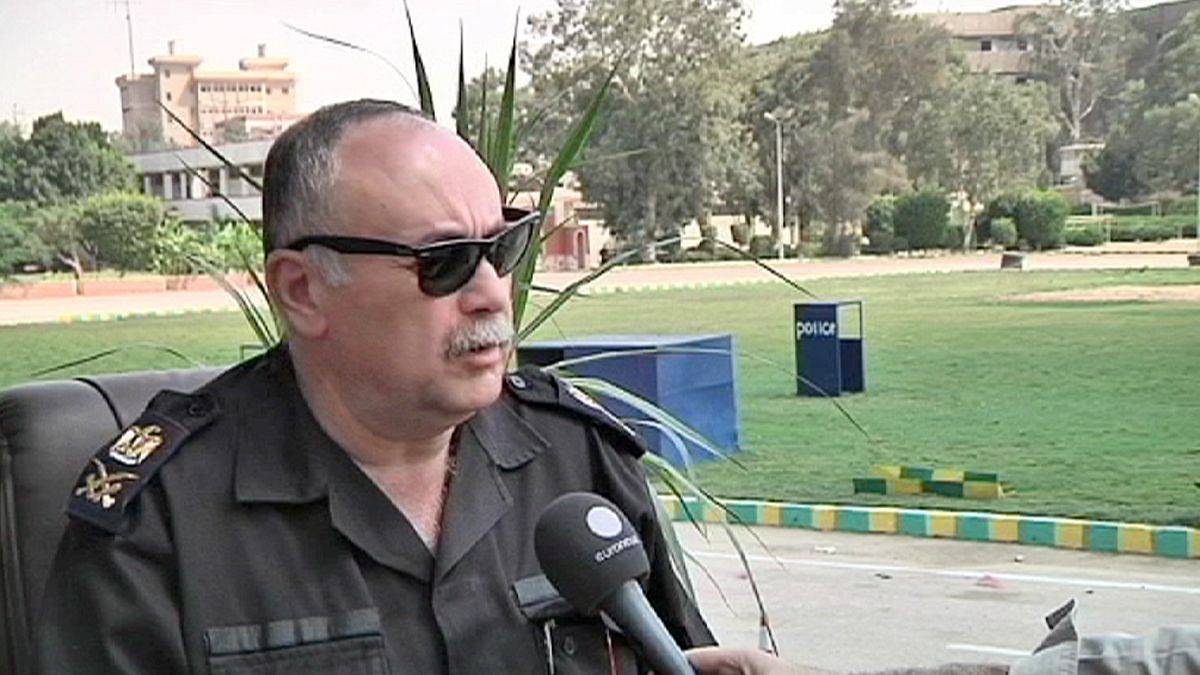Egypt’s security forces, known as the CSF, were condemned by Egyptians and international human rights organisations during the 2011 Arab Spring uprising there, as using brutal force against protesters. They were also criticised in June this year.
The Muslim brotherhood accused the CSF forces in August of killing hundreds of protesters in Cairo’s Rabaa al-Adaweya camp and al-Nahda Square – of shooting people and pouring in teargas. The CSF refutes those accusations and challenges anyone to come up with firm evidence.
Our Cairo correspondent, Mohammed Shaikhibrahim, has been a witness of some of the results of recent violence.
The head of the CSF allowed him to attend drills at a military training camp, for a close look at exercises. These, we are told, are the methods, arms and equipment used to break up sit-ins or civil disturbances.
Our correspondent was also able to video a United Nations delegation inspecting the forces showing their work.
The para-military staging included scenarios of how to deal with a potential car bomb threat, gang crimes, fire fights at army checkpoints, assassination attempts against political and security figures, riots and peaceful protests.
The CSF has been considered the Egyptian government’s most potent resource for maintaining national order for many years. It consists of more than 300,000 officers and men.
This force guards all public facilities and important sites around the country, and is the foremost restraint against Egyptian protesters. This was especially true in the recent ouster of former president Mohammed Morsi of the Muslim Brotherhood.
Egyptian police and army forces in August carried out a long-threatened crackdown against Morsi followers, using tear gas, live fire and bulldozers to disperse them.
A state of emergency has been in effect since mid August.
After the CSF demonstration (the military staging described above), our correspondent had a rare interview with the Central Security Forces Commander-in-chief, Major General Ashraf Abdulla. This was after our journalist had seen some of recent carnage. Various parties are attributing it to others. These include Islamists, the army and the CSF.
[All statements given in this text, or questions posed, are strictly attributed to the person saying them. – euronews]
Mohammed Shaikhibrahim, euronews, said: “The CSF have been severely criticised, especially after the Rabaa and Al-Nahda dispersion, accused of using excessive force, and of incompetence in how they dispersed people. How would you respond to such claims?”
Major General Ashraf Abdullah’s answer was: “These are false claims coming from biased media outlets backed by the Muslim Brotherhood, that is spreading false rumours.”
Then the general said: “The reputation of our forces in dispersing both sit-ins remained intact and was praised by all nations of the world. No one has pointed a finger at us over possible mistakes.”
He said: “It was all done in adherence to international standards, and we did not kill or aim at a woman or a child, despite the number killed on our side.”
According to General Abdulla: “That Muslim Brotherhood claim is false, and I refute it completely.”
Then Mohammed put it to Egypt’s Central Security Forces top official: “Some human rights organisations have called for an international investigation into what happened at Rabaa and Al-Nahda. Would you be willing to co-operate with that?”
“No such investigation will be carried out,” said General Ashraf, “since it is the Muslim Brotherhood that is behind the call. No European countries or even the United States have hinted at this. This is the first time I hear what you are telling me.”
He asked: “Why did the United States decide to come and speak now about the killings of journalists during the dispersion of the Rabaa sit-in? We haven’t heard about that. Where were they killed?”
“Let the human rights organisations come and see our riot dispersal weaponry. It’s just like what the US uses, perhaps even better. The average American policeman carries a rifle, but we don’t carry that weapon in breaking up sit-ins.”
The general put to our correspondent the following: “So, now the United Stated is talking about human rights?! Where are human rights in Afghanistan, Palestine, Libya, Tunisia, or Egypt?”
He questioned: “Who murdered the people in Rabaa? Is it possible that all these bodies that were present inside the Eiman mosque and in the square itself were murdered the day of the dispersal action? What about the blocks of ice that were present inside the mosque? What were they doing there? Why didn’t they send the bodies for forensic testing?”
[The forensic testing of bodies is normally a task managed by a police authority. – euronews]
In Ashraf’s words: “There is proof that Egypt respects human rights, otherwise it would have been expelled from the United Nations.”
He further challenged accusers with: “You’ve all seen the bodies inside the Eiman mosque; and after Rabaa Square was cleared out, we found buried bodies covered and shrouded. How is it possible that we murdered them and wrapped them in shrouds? How?”
